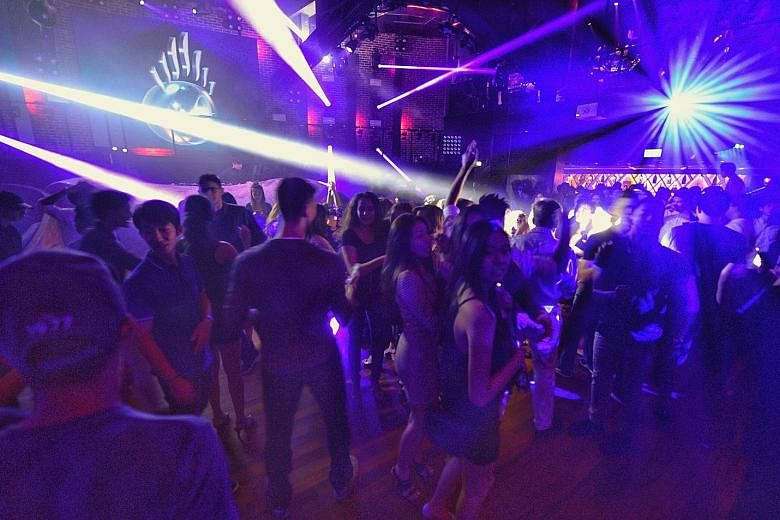Repeatedly, yesterday's parliamentary sitting had to tackle a public policy problem: When something bad happens, who do you hold accountable?
Also, on whom do you impose changes to make sure the harmful event does not happen again?
MPs seem to feel the burden should fall on businesses.
In two cases yesterday, they proposed stricter industrywide rules for them to comply with.
However, it may not be so clear that businesses are to blame.
The first case involves the Public Entertainments and Meetings (Amendment) Bill, on how to regulate public entertainment outlets. MPs raised concerns about inebriated nightclub patrons who brawl outside the club's premises, disturbing residents at best and resulting in deaths at worst.

They cited the case of American stuntman John Denley Nelson, 30, who died from head injuries when he stepped in to help a friend embroiled in a fight outside a Boat Quay club on Christmas Eve in 2015.
Nightclub operators should be held responsible for such incidents, said Ms Lee Bee Wah (Nee Soon GRC) and Mr Melvin Yong (Tanjong Pagar GRC), arguing that these business owners must do more to ensure safety.
"We should impose greater responsibility on the operators of these night spots to provide the protection to the public and maintain good order," said Ms Lee.
The argument was that because such fights often start inside the club, some fault must lie with the club, even if the fight ends outside.
Mr Yong described how nightclub operators figured out a way to game the system, having "grown savvy in avoiding trouble in a very technical sense".
"The bouncers will ask the patrons to smoke or fight outside of the outlets instead, so they will not get any demerit points or violate licensing conditions," he said, citing anecdotes from his residents.
Mr Yong named three examples in his constituency: Balmoral Plaza near Newton, Orchard Towers, and the area around Mount Sophia near Dhoby Ghaut.
He suggested a review of the demerit points to account for this.
Ms Lee asked if it could be made mandatory for nightlife venues to hire better qualified and trained security officers to maintain public order outside their premises.
Parliamentary Secretary for Home Affairs Amrin Amin, who presented the Bill for debate, pointed out that the police will require all nightclubs to install CCTV cameras at entrances and exits, to deter crimes in and around their premises. But such a move will require a separate regulation beyond yesterday's Bill.
The Government is also exploring new licensing conditions with appropriate demerit points to address the issue of law and order incidents originating from public entertainment outlets.
"Licensees should take reasonable steps to respond to incidents that originate from their premises even if they spill out of the premises," he said.
Undoubtedly, more can be done to prevent tragic deaths like Mr Nelson's. CCTVs help to achieve that aim, and the club too benefits by deterring crime in its premises.
But holding public entertainment licensees responsible for fights and crimes that take place outside their premises seems like a grey area.
For one thing, it is a public area, and the security of such places should be the responsibility of police officers.If a fight that began brewing in the club breaks out 1km away from it, is it still the operator's fault? Where should the line be drawn? Also, is it reasonable to make an entire industry spend more on security staff just because of a few black sheep?
There were 38 incidents of violent crime, including serious hurt and rioting, in public entertainment establishments last year, noted Mr Amrin. At the same time, there were a total of 2,700 public entertainment licensees.
So, it would appear unfair to penalise the vast majority for the sins of a few. This is particularly so if preventive steps are not within the control of a club, bar or pub.
In the second case, Dr Tan Wu Meng (Jurong GRC) asked whether the National Environment Agency could mandate that all eatery workers, even cleaners, be trained in food safety. Such mandatory training could reduce the chances of food poisoning, he argued.
But employees who handle food already have to go for basic food hygiene courses, Senior Minister of State for the Environment and Water Resources Amy Khor said.
Sending everyone for these courses is like making every Tom, Dick and Harry undergo special ops training to defend the country.
Would that not be overkill when non-food handlers, like cleaners, do not prepare or serve food. So they would have no direct impact on food safety and public health.
It may not be practical as the food and beverage industry has a high turnover and employs many temporary staff. The industry is already feeling the pain from the requirement that all food handlers be trained and registered, noted Dr Khor, who also said there have been 3.2 food poisoning outbreaks per 1,000 food retail establishments since 2013 - a rate of 0.32 per cent.
Few would declare that doing business in Singapore is a piece of cake. Even fewer would think the majority of these businesses could stomach stricter standards, especially at a time when those in the retail and services sectors are struggling to cope with costs amid a slowing economy.


